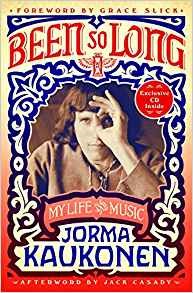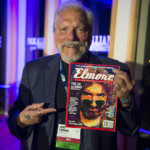 I’m assuming here that 99.9 % of Elmore readers do not need any introduction to Jorma Kaukonen. But there are always new people turning up on our planet, so with that in mind, I have two names of iconic groups for you newbies: Jefferson Airplane and Hot Tuna.
I’m assuming here that 99.9 % of Elmore readers do not need any introduction to Jorma Kaukonen. But there are always new people turning up on our planet, so with that in mind, I have two names of iconic groups for you newbies: Jefferson Airplane and Hot Tuna.
That said, there are three brief intro pieces in Kaukonen’s memoir Been So Long. All three help set the table for a highly humanistic, fascinating journey through seven decades of memories and music history which are intertwined from as far back as he can recall—around age two, with his mother singing, or the radio on. Grace Slick wrote the first one, and is someone you think would know almost everything anyone wants to know about her Jefferson Airplane bandmate. Right off the bat Slick says she had no idea that during the Airplane’s six-year flight at the top of the rock world, that jolly Jorma was often walking Winston Churchill’s “Black Dog” (dealing with depression stoically). Grace calls the book a “modern parable.” That makes perfect sense, for Kaukonen’s been singing parables like Rev. Gary Davis’ “Keep Your Lamp Trimmed and Burning” for much of his soon-to-be 78 years. So why not write a great big one, especially when you have lived it? Jorma follows with two intros “Into The Light,” and “Introduction” that lay out his reasoning and the routes he is about to take you on. Buckle up, Pilgrim!

That old cliché “If you remember the ‘60s, you probably weren’t there” does not apply here. The stories throughout the book were excerpted from the journals he has kept through the years. In telling his story, Mr. K is as honest as a Scandinavian winter night. How do I know? Though I have only seen him perform (at places like the Fillmore East with each of his signature bands in the ’60s and ’70s), there are details and stories about many behind-the-music-scene people and name players whom I knew personally too, from my own 60 years in the music business—so I can honestly say this book is bullshit free. Jorma tells it like it was and is. After reading it twice, a follow-up phone conversation with him confirmed my assessment of not just who the man I just got to know a whole lot better is, but that his take on others—the good, the bad, and the batshit crazy—is spot on. As we shared a few parallel parables on the phone, Jorma would often say, “You can’t make this shit up.” No sir, no way, no how. And to his credit, he writes it all in a way that is very real, no matter how surreal the situations got.
With his grandfather Jaako emigrating here from a tiny town in northern Finland at the close of the 19th century, Jorma gives you a solid and exciting background on both the Kaukonens and his mother Beatrice Levines’ family, who escaped from Russia not long before the Russian Revolution. His father, “Big Jorma,” was in the US Foreign Service and attached to embassies, so Jorma, aka “Jerry” at that time, got to spend his formative years in places like Pakistan, the Philippines, and later in Sweden, as well as visiting ports of call like Egypt, Italy, and Guam. Back home in Washington DC in 1956, he reunited with his school friends and got to see an old school chum strumming—not on the old banjo, but a sunburst Gibson J-45—and that was where the Jorma the world would come to know, saw the light.

For those who come for the rock icons and the nostalgic festivals of Monterey, Woodstock and the lights-out deadly kibosher, Altamont, there is a real smorgasbord of events. Kaukonen was a peer and a good friend to many, including Janis Joplin, Jerry Garcia, David Crosby, and was there for all the inclusions, at all extra costs of sex, drugs, rock and roll and demon rum. But he is never salacious, nor cavalier about how he talks about it. There is still much more to his story.

His two marital relationships, now totaling 50 years, is a book in itself. His mechanical gearhead side and his long relationship with motorcycles, an affair that could have ended in Karachi, circa 1953 on his first 50-foot ride on a borrowed BSA into a closed garage door; Then again two years later in Manila, on his first sojourn on a borrowed Triumph, going off the road to avoid being wiped out by a truck. It was no triumph for the rider or the machine, which got the worst of it. The survivor names his first band The Triumphs, in which he was joined by high school friend, fellow traveler and bassist Jack Casady. Jack is still playing music with his best friend of well over 60 years, and closes this well-told tale with the Afterword. In his parting shot, Casady states “ You have taken me on one great adventure, Jorma, I look forward to another quarter of a century or so of your continued quest.” To which I would add a line from “Genesis,” my favorite Jorma tune with lyrics, “I’d like to go with you.”
— Ken Spooner





Be the first to comment!